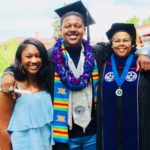 In my youth, I started the discussions about an upcoming birthday months before my birthday actually arrived. In my mind, a birthday was the next best holiday to Christmas. Each year, I promoted my next birthday to my family ensuring that nobody would forget. As a youngster, I made certain that at least my parents and my older brother understood the expectation of the gift that should accompany the happy birthday wish. Interestingly, my children did the same. As I approach my next birthday, this childhood ritual makes me chuckle and think about the evolution of my birthday experiences.
In my youth, I started the discussions about an upcoming birthday months before my birthday actually arrived. In my mind, a birthday was the next best holiday to Christmas. Each year, I promoted my next birthday to my family ensuring that nobody would forget. As a youngster, I made certain that at least my parents and my older brother understood the expectation of the gift that should accompany the happy birthday wish. Interestingly, my children did the same. As I approach my next birthday, this childhood ritual makes me chuckle and think about the evolution of my birthday experiences.
As a child, I think I wanted everyone to recognize that there was significance to me getting a year older. My childlike thought process equated getting older to being grown and in charge of my life. Grown was a status worthy of attainment if it meant independence from the control of the grown folks in my village. Grown status excited me and I think most children are excited about getting a year older. Heck, most children and their parents count age in months until the age of two after which the half year designations begin. Have you ever heard a child say “I am seven and a half?” I laughed with my son last week as we considered at what age people stop pronouncing their ages in units of half years. We had just seen a commercial in which the commercial mom said her son was “fourteen and a half.” Neither of us had ever heard anyone over the age of ten or eleven use a half year so this company failed the reality test for us. Their failure is probably the reason why I can’t remember their brand.
Ironically, one of the birthdays I remembered was my tenth birthday. I got a new wallet and my parents put ten dollars in it. Ten dollars was a lot of money. That memory raised another question for me: When did my parents stop giving me a dollar per year of life? As I reflect, two other birthdays celebrations come to mind, but I can’t remember my ages, but I think both happened under the age of ten. One party was in the backyard at my house. I was allowed to invite some close friends from school who lived in my neighborhood and some cousins. My father grilled hot dogs and filled the plastic pool with water. It wasn’t called a “pool” party because the pool was more for wading and cooling off on a hot summer day in Alabama. Another party that I recalled was a sleepover at the house. I invited a less than ten girls over. I don’t really remember all that we did that night, but I bet we did a lot of giggling and watching television until the local station played the national anthem and shut down for the night. One of my childhood friends who attended the sleepover reminded me, during a conversation several years ago, that mother cooked homemade pancakes for us the morning after the sleepover. I can’t remember having a birthday party after ten, but I got my learner’s permit to drive at fifteen and my driver’s license the following year.
Well, as I approach my next birthday, my thoughts have included feelings of thankfulness for the gift of another year of life and more appreciation for opportunities to connect with family and friends. In my reflective moments, I have found myself working to focus on my abilities and how to use abilities and opportunities to achieve goals and dreams while I can. Unlike my childhood self who looked forward to being grown, the adult, middle-aged me recognized how fast the years have gone and how much I wished I could have accomplished in the years I was gifted. I have battled to make the former adult wish the dominant focus in order to maintain a positive perspective of the latter. I decided that the lack of life experience in my childhood was actually a blessing. There was something about not knowing what I didn’t know that kept my dreams alive. In my adulthood, I have learned that life experiences, if allowed, can put a damper on what should be a celebration of life itself.
Since the age of forty, I have intentionally planned things to do to keep my spirits up as I reflect on past decisions, unexplained outcomes, fruitless pursuits, and the unknown situations ahead. I usually plan some type of nail appointment, a short excursion, or time with family and friends. This year, I waited too late to schedule my nail appointment, but the week was not without fun times.
Twice this week I spent time with some of fellows visiting Reno as a part of the Nelson Mandela Fellows Program. A few weeks ago I talked them about ways that I found to help me sustain my visions. Collectively, the fellows encouraged me to continue using stories to encourage, enlighten, and empower. It was the individual and small group time with fellows this week that gave me the positive, affirming thoughts I needed as I approached another birthday. Tuesday evening I shared a meal with a fellow who talked about her life as a wife, mother, and entrepreneur. She compared my warmth to the early days of Oprah. She explained that many of them wanted to spend more time getting to know me because they were touched and inspired by my personal and transparent talk about the varied intersections of my life. I told her that hearing about her methodical pursuits to attain her ultimate dream encouraged me. We talked about parenting and the balance of work and family. Our time together affirmed me that there was benefit in me taking the risk of telling my truths in order to uplift others or to provide a guide for them on things to avoid on their way to greatness. She appreciated the support and advice and assured me that others wanted to maintain communication with me in order to interact with someone who they believed was sincere.
Later in the week, I had dinner with a small group of fellows and friends. When I entered the house, four of them greeted me with excited smiles and the giddiness of children. I looked forward to visiting with them and I considered them the honored guest of our community so their demonstrated respect and excitement for seeing me was shocking. I learned that because of my presentation one of them wanted to start a blog and another fellow shared my picture and blog with his girlfriend back home who wanted to write. I also learned that my presentation that was lacking the expected powerpoint gave power to my voice. They said that I engaged them because my comments came from my heart and without a script. Ironically, my purpose was fulfilled because they were uplifted and inspired because of my flaws, challenges, mistakes, and successes. Their inspired work inspired me. Their youthful energy and innovative risks encouraged me to evaluate my life in terms of how my maturity and opportunity can expand my scope and territory. This week I was reminded that when I gave of my gifts and talents to others without any expectation to receive back from them I felt the greatest blessing.
Life has also taught me that there is much to learn from youthful members of the global community. Moreover, life has taught me that exposure to the elders honors our past and should inform our future. A few weeks ago I read that the Blind Boys of Alabama would be in concert here this week. A friend gave me a couple of tickets and another bucket list experience happened. I grew up in Alabama and the Blind Boys of Alabama were home state celebrities and living testaments of folks who overcame. Their testimonies of resiliency and faith rooted in a God who “opened doors that their blind eyes could not see” charged my body that was running on fumes that day. I didn’t go home after work that day because I knew that I might not convince myself to get back into the car to ride to the concert venue. Once I saw them filing onto the stage, my soul thanked the rest of me for putting mind over matter.
I needed to sit under the teaching of the Blind Boys of Alabama. Their soulful and soul felt vocals accompanied by Paul Thornton’s band fed my soul and lifted my spirit. This group has been singing longer than I have been alive. They have lost and added members yet maintained the passion, purpose, and professionalism their audiences expected. Clearly, the call to minister to a global community came from a heavenly source because most of us humans would have never believed that a group of Black men from the south who were blind could make a living singing old spirituals and hymns.
The consistency and commitment to their calling modeled for me the potential for continuing in years of service using just what God has given you to use in service. They sang the lyrics “You got to move” in one song and “I shall not be moved” in the next song. I laughed because both directives were true in order to sustain a vision and find purpose every year of your life. I’ve heard people say that “what you don’t use, you lose” so I guess that’s why “you got to move.” You got to move the dial on your self-imposed limitations. You got to move the negative, disaffirming, and unproductive people and thoughts from your space. You got to move toward productivity, goal setting, and performance of the things you say you love to do and are equipped to do.
You “should not be moved” when people and things infuse nonsense and distractors into your world in an effort to derail your plan or to create detours designed to take you off of the route that is your destined course. You should stay the course and “not be moved” even when life presents physical challenges. You “should not be moved” even when you believe your humility in service is taken for granted. You “should not be moved” by the inability of others to fully understand your challenges or your continued efforts to pursue your calling.
I watched and later met men who have weathered some storms in their lives with humility and gratefulness. I didn’t get to meet Jimmy Carter from Birmingham, but his energetic spirit coupled with his wit took me back South. Their harmony reminded me of pray meetings during revivals and funeral in the country when churches had wooden floors. Mama used to say the parishioners were “patting their hand and their feet.” The Blind Boys of Alabama aided my virtual journey back home to a time when life was simple and people relied on the harmonious relationship of God, person, family, and community. Like the peace experienced when we indulge in the basics of life without distractions and noise in our periphery, the harmonies of their voices held their own against the band that competed for air space. Their messages of hope and faith resonated with me and modeled for me that your message and service can be received even when you are distracted or challenged.
Last year brought challenge in my life and I am pretty sure that this year won’t be without challenge. I am thankful this year for the time spent with young African entrepreneurs who have succeeded despite challenging lives and the Blind Boys of Alabama whose challenges I don’t believe I will ever completely know or understand. I was thankful that Ricky McKinnie and Benjamin Moore took time to sign my CD, take a picture with me, and talk about being from the South. Benjamin touched my heart with his promise to shout out to Montgomery on my behalf when they “roll through” that city again. Ricky and I talked about being July birthday buddies. I thanked them for bringing a taste of home to the West Coast. I wished them a safe journey and let them know they were welcomed to return to our city to perform again whenever their scheduled permitted.
I hope that as you move through your days doing the things that you claim to love doing you will embrace the teaching moments presented by those you think you are helping or serving. Be ready for the sarcasm and humor that life might hand to you at times that you don’t expect to be entertained or taught anything at all.
 Have you ever felt that you wee living in the eye of a storm? This week, I laughed with a couple of friends as we discussed how the timing of some circumstances in my life created a perfect storm. Why did that make me laugh out loud? I don’t know, but often I think I laugh to keep from crying.
Have you ever felt that you wee living in the eye of a storm? This week, I laughed with a couple of friends as we discussed how the timing of some circumstances in my life created a perfect storm. Why did that make me laugh out loud? I don’t know, but often I think I laugh to keep from crying.
 I learned of the Microsoft DigiGirlz Camp several years ago. It didn’t occur to me at that time that I would ever be a part of the camp experience. It was no secret that I was outside of the target age range to be a camp attendee and my daughter outgrew her eligibility for registration for the camp many years ago. So, I never explored the mission or methods of the DigiGirlz Camp before this year.
I learned of the Microsoft DigiGirlz Camp several years ago. It didn’t occur to me at that time that I would ever be a part of the camp experience. It was no secret that I was outside of the target age range to be a camp attendee and my daughter outgrew her eligibility for registration for the camp many years ago. So, I never explored the mission or methods of the DigiGirlz Camp before this year. In my youth, I started the discussions about an upcoming birthday months before my birthday actually arrived. In my mind, a birthday was the next best holiday to Christmas. Each year, I promoted my next birthday to my family ensuring that nobody would forget. As a youngster, I made certain that at least my parents and my older brother understood the expectation of the gift that should accompany the happy birthday wish. Interestingly, my children did the same. As I approach my next birthday, this childhood ritual makes me chuckle and think about the evolution of my birthday experiences.
In my youth, I started the discussions about an upcoming birthday months before my birthday actually arrived. In my mind, a birthday was the next best holiday to Christmas. Each year, I promoted my next birthday to my family ensuring that nobody would forget. As a youngster, I made certain that at least my parents and my older brother understood the expectation of the gift that should accompany the happy birthday wish. Interestingly, my children did the same. As I approach my next birthday, this childhood ritual makes me chuckle and think about the evolution of my birthday experiences. When my daughter was four or five months old, I became a dorm mother to forty-nine boys who were boarding students at an all male preparatory school. Forty-one of the boys were ninth graders ranging in age from thirteen to fifteen. The other eight were high school seniors ranging in age from seventeen to nineteen. Until my life’s journey introduced me to the McCallie School, I thought that boarding schools existed for purposes of good television as depicted in “The Facts of Life.”
When my daughter was four or five months old, I became a dorm mother to forty-nine boys who were boarding students at an all male preparatory school. Forty-one of the boys were ninth graders ranging in age from thirteen to fifteen. The other eight were high school seniors ranging in age from seventeen to nineteen. Until my life’s journey introduced me to the McCallie School, I thought that boarding schools existed for purposes of good television as depicted in “The Facts of Life.” In the last six months, I learned some of the benefits of self-awareness. I learned that it was not enough to be self-aware, but that the awareness had to promote actions specifically targeted at addressing the challenges, limitations, curiosities, or strengths revealed after gaining awareness.
In the last six months, I learned some of the benefits of self-awareness. I learned that it was not enough to be self-aware, but that the awareness had to promote actions specifically targeted at addressing the challenges, limitations, curiosities, or strengths revealed after gaining awareness. Some days I have wondered if my mom had crazy dreams in her youth that other folks thought were outlandish. My guess was that young women, especially Black girls, in her day weren’t encouraged to dream outside of the predetermined categories established by someone other than the young women. Those who were lucky enough to have access to higher education knew that they were expected to be teachers, nurses, secretaries, and librarians. I believed that Mama had a calling on her life to teach because she dedicated more than forty years to educating students. While I don’t think that Mama chose her profession because of societal pressures, I always knew that she had awareness that for many women their futures, their lifestyles, and their trades were greatly influenced by expectations of others. She never said that young women in her day were coached to conform to societal norms and select career fields that supported life as a mother, caretaker, or teacher, but that was my perception.
Some days I have wondered if my mom had crazy dreams in her youth that other folks thought were outlandish. My guess was that young women, especially Black girls, in her day weren’t encouraged to dream outside of the predetermined categories established by someone other than the young women. Those who were lucky enough to have access to higher education knew that they were expected to be teachers, nurses, secretaries, and librarians. I believed that Mama had a calling on her life to teach because she dedicated more than forty years to educating students. While I don’t think that Mama chose her profession because of societal pressures, I always knew that she had awareness that for many women their futures, their lifestyles, and their trades were greatly influenced by expectations of others. She never said that young women in her day were coached to conform to societal norms and select career fields that supported life as a mother, caretaker, or teacher, but that was my perception.